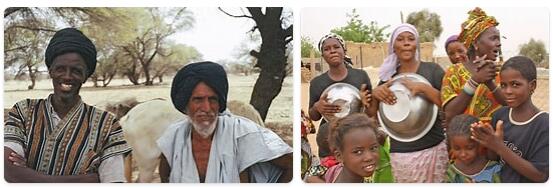
Yearbook 2004
Mauritania. During the summer, Mauritania was seriously affected by grasshopper invasions. The total population in Mauritania is 4,649,669 people in 2020. Swarms with up to 80 million insects per square kilometer for up crops and pastures. The grasshoppers also invaded the capital Nouakchott, where all leaves were peeled from the trees as well as the grass at the national football stadium. The southern parts of the country were hit hardest. There, nearly half of the crops and pastures were destroyed. Hundreds of thousands of people were left without food. According to the United Nations Food and Agriculture Organization (FAO), which labeled it as the worst insect pest in the region in 15 years, half of the country’s grain crops were at risk of being lost. Aid organizations warned of an imminent famine disaster. Mauritania, like other affected countries in West Africa, received food shipments and assistance from, among others UN and EU. But in November, when grasshopper swarms still existed in some quarters.
According to the government, two planned coup attempts were halted during the fall. In August, between 20 and 30 army officers were arrested, accused of planning to take power while President Maaounya Ould Sidi Ahmed Taya was visiting France. Most of the arrested belonged to the same ethnic group, awlad nasser, as those who were behind the coup attempt in June 2003. Then the government pointed out Islamists as the guilty ones.
In September, the Interior Minister stated that another coup attempt had been stopped. A large number of weapons were seized and former army officer Saleh Ould Hanena was arrested, accused of leading all three coup attempts. The police also seized three opposition Islamic leaders. The opposition is dissatisfied with President Tayas USA and Israel-friendly politics. The government also accused Burkina Faso and Libya of being involved in coup attempts during the year, which both countries denied. In November, trials began against the 170 military and 11 civilians, including former President Mohamed Khouna Ould Haidalla, who are suspected of involvement in the three coup attempts. The trial started late when the defendants’ defendants announced that they would boycott the process because one of their colleagues had also been arrested. The judge then assigned two defendants who were not lawyers. These had to replace the more than 60 lawyers who left the courtroom. According to the lawyers, the trial was merely an attempt to silence the opposition.

Population
81.5% of the ethnic framework is made up of Mauri, descendants of Berbers and Arabs fused with the Sudanese element which, originally from the country, forms the remaining part of the population.
The population of Mauritania has been growing steadily since the 1970s mainly due to the birth rate which remains at high levels (34.1 ‰, in 2009), higher than those of mortality (9.1 ‰). About 90% of the population lives in the southern territories, where there are, in fact, numerous important towns, including Kaédi and Rosso, both in Senegal; other important centers are Nouamghar, on the coast, Zouérat and Atar in the interior. Until the 1970s, the majority of the population, especially in the North, was dedicated to nomadic farming, but the period of economic expansion that affected the country in the last decades of the 20th century. and the drought cycles have profoundly changed the habits of life. The nomadic and semi-nomadic population has shrunk to just over a tenth of the total (in 1965 it was about 80%) while the defined urban population has grown (41% in 2008).
Official language is Arabic, but in common use French and numerous dialects derived from Arabic itself are spoken. Prevailing religion is Islamic, Sunni (99.3%).